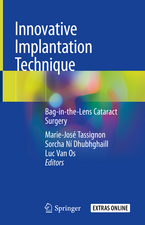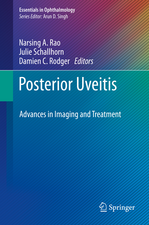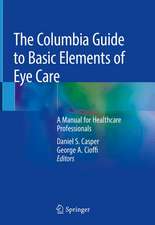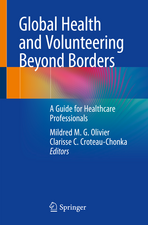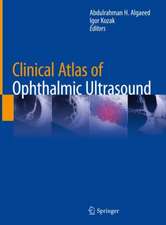Posterior Capsular Rent: Genesis and Management
Editat de Arup Chakrabartien Limba Engleză Hardback – 7 mar 2017
1.Identifying patients at higher risk and measures to manage such patients by surgical discipline
2.Intraoperative management of posterior capsular rupture (PCR) to minimize long-term complications
3.Post-operative care for a patient who has a PCR
Cataract surgery is the most commonly performed surgical procedure in ophthalmology and despite tremendous technical and technological advancements, PCR still occurs. PCR occurs both in the hands of experienced senior surgeons and the neophyte surgeons, although with a higher frequency in the latter group. Additionally, certain types of cataracts are prone to this development. If managed properly in a timely manner the eventual outcome may be no different from that of an uncomplicated case. However, improper management may lead on to serious complications with a higher incidence of permanent visual disability.
Written for experienced and not-so-experienced eye surgeons alike to understand and manage PCR.
| Toate formatele și edițiile | Preț | Express |
|---|---|---|
| Paperback (1) | 593.74 lei 38-44 zile | |
| Springer India – 7 aug 2018 | 593.74 lei 38-44 zile | |
| Hardback (1) | 866.83 lei 38-44 zile | |
| Springer India – 7 mar 2017 | 866.83 lei 38-44 zile |
Preț: 866.83 lei
Preț vechi: 912.45 lei
-5% Nou
Puncte Express: 1300
Preț estimativ în valută:
165.87€ • 173.62$ • 138.05£
165.87€ • 173.62$ • 138.05£
Carte tipărită la comandă
Livrare economică 27 martie-02 aprilie
Preluare comenzi: 021 569.72.76
Specificații
ISBN-13: 9788132235842
ISBN-10: 8132235843
Pagini: 298
Ilustrații: XIX, 279 p. 162 illus., 144 illus. in color.
Dimensiuni: 178 x 254 x 23 mm
Greutate: 0.87 kg
Ediția:1st ed. 2017
Editura: Springer India
Colecția Springer
Locul publicării:New Delhi, India
ISBN-10: 8132235843
Pagini: 298
Ilustrații: XIX, 279 p. 162 illus., 144 illus. in color.
Dimensiuni: 178 x 254 x 23 mm
Greutate: 0.87 kg
Ediția:1st ed. 2017
Editura: Springer India
Colecția Springer
Locul publicării:New Delhi, India
Cuprins
Anatomy of the Crystalline Lens.- Anatomy of the Vitreous.- Incidence, Magnitude and Significance of the Problem.- Posterior Capsular Rents – Predisposing Factors.- Management Strategies for Cataracts with Pre-existing PCR.- How to Reduce the Incidence of Posterior Capsular Rupture – Surgical Pearls.- Posterior Capsular Rupture during the Phaco Learning Curve – Tips on How to Reduce the Incidence.- Posterior Capsular Rent – Early Diagnosis.- Posterior Capsular Rupture – Various Case Scenarios.-Management of Vitreous Disturbance and Basic Principles of Anterior Vitrectomy.- Staining of the Vitreous/Enhancing Visibility of Vitreous.-Bimanual Vitrectomy from Limbus.- Bimanual pars plana Anterior Vitrectomy.- Posterior Assisted Levitation (PAL).- IOL Options in the Presence of Posterior Capsular Rent.- ACIOL.- Iris Claw IOLs.-Sutured Scleral Fixated IOLs.- Unsutured Scleral Fixated IOLs.- Glued IOLs.- Management of Retained Lens Matter in the Postoperative Period.- Posterior Capsular Rent – Sequelae.- Postoperative Management of an Eye that has Suffered a Posterior Capsular Rupture.
Notă biografică
Dr. Arup Chakrabarti, MS, Chief Cataract and Glaucoma Services, Chakrabarti Eye Care Centre, Trivandrum, Kerala, India
Textul de pe ultima copertă
This book deals with a potentially sight threatening complication - rupture of the posterior capsule – during cataract surgery. This handbook covers the management of this problem from 3 perspectives:
1.Identifying patients at higher risk and measures to manage such patients by surgical discipline
2.Intraoperative management of posterior capsular rupture (PCR) to minimize long-term complications
3.Post-operative care for a patient who has a PCR
Cataract surgery is the most commonly performed surgical procedure in ophthalmology and despite tremendous technical and technological advancements, PCR still occurs. PCR occurs both in the hands of experienced senior surgeons and the neophyte surgeons, although with a higher frequency in the latter group. Additionally, certain types of cataracts are prone to this development. If managed properly in a timely manner the eventual outcome may be no different from that of an uncomplicated case. However, improper management may lead on to serious complications with a higher incidence of permanent visual disability.
Written for experienced and not-so-experienced eye surgeons alike to understand and manage PCR.
1.Identifying patients at higher risk and measures to manage such patients by surgical discipline
2.Intraoperative management of posterior capsular rupture (PCR) to minimize long-term complications
3.Post-operative care for a patient who has a PCR
Cataract surgery is the most commonly performed surgical procedure in ophthalmology and despite tremendous technical and technological advancements, PCR still occurs. PCR occurs both in the hands of experienced senior surgeons and the neophyte surgeons, although with a higher frequency in the latter group. Additionally, certain types of cataracts are prone to this development. If managed properly in a timely manner the eventual outcome may be no different from that of an uncomplicated case. However, improper management may lead on to serious complications with a higher incidence of permanent visual disability.
Written for experienced and not-so-experienced eye surgeons alike to understand and manage PCR.
Caracteristici
Comprehensive coverage of only one single complication in cataract surgery Written and edited by experienced surgeons in the field Includes chapters on potential sequelae of an inadequately managed case of PCR Offers surgical tips on how to avoid the occurrence of PCR and minimize damage in the event of a PCR


